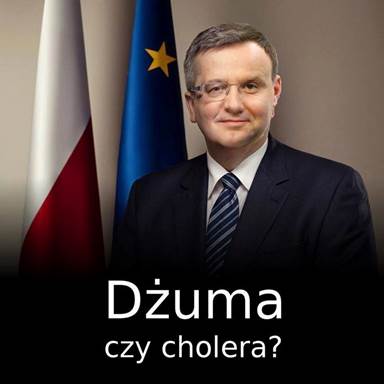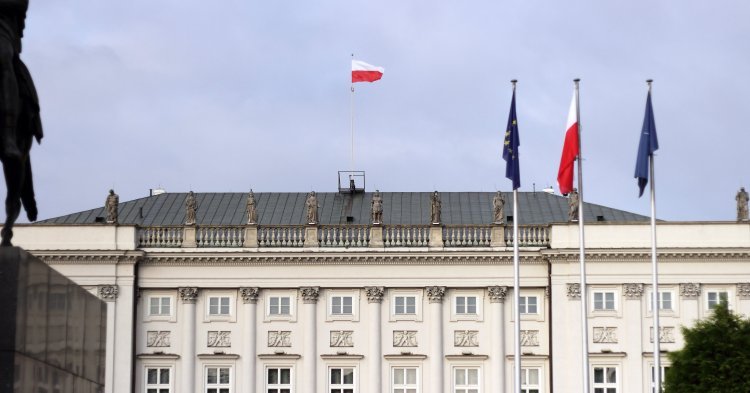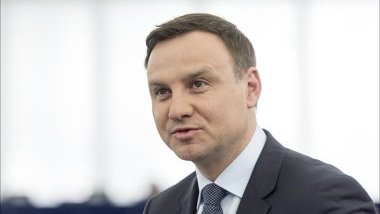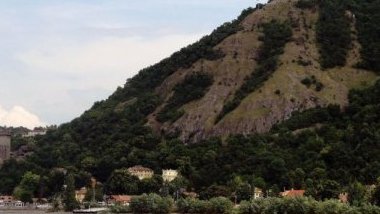Although popular Polish memes have focused on these two and compared the choice between them in the second round to the choice between plague and cholera, perhaps the most interesting phenomenon here is the unexpectedly high score of almost 21 percent of an ’anti-system candidate’, ex-rock musician Paweł Kukiz in the first round on the 10th of May. Both Duda’s victory and Kukiz’s score in the 1st round constitute a very tangible sign of a shift in Poles’ view on politics, a shift that is likely to set the tone for the parliamentary elections this autumn.
The rise of an anti-system candidate
Pawel Kukiz’ score of 20.8 percent of votes in the first round is something no one had predicted. Pre-election polls put him at 14.3 percent at most. Was his phenomenal score a ’yellow card’ for the final contestants, Mr Duda and Mr Komorowski? Or could it be, in its entirety, that voters simply agree with his proposal of introducing single member parliamentary electoral constituencies, idea on which he based his entire campaign?
Alongside this one idea, it was mostly the image (or actually the lack thereof) of a ’nonpolitical, real’ candidate, an anti-system ’hero’, who’d just appeared on the stage to among the charade of politicians to ’save us from it all’. It was impossible for him to get to the second round, but his success is often described as the only ’real success’ of these presidential elections, and it definitely shows that Poles are no longer satisfied with the political stage monopolised by two major players, constantly fighting their way back and forth.
Since Kukiz’ score of 21% was announced, it was clear that the prospective candidates would have to convince his voters, along with the ’stay at home’ left-wing electorate.
Where is the left?
Duda’s success in the first round (1 percent more than Komorowski) can largely be pinpointed to the left electorate ’stay at home’ strategy - people for whom, it seems, there was no candidate who’d be worth their time. For them, voting for Mr Komorowski was ’the last resort’, the act of desperation in the second round but in no way the choice of the first round. Truth be told, the left of the Polish political stage was plainly absent in these elections. The Democratic Left Alliance, the major left-wing party that has already governed twice (93-97 and 01-05), fielded 35 year old Magdalena Ogórek, a historian with little (close to none) high profile political experience – and it backfired, oh how it backfired on them. This controversial candidacy had indeed taken over the media, but not in the way the Alliance hoped it would; instead she quickly became a mocking figure, with her personal style and private life discussed more often than her political programme (which was also rather absent and where it existed, it was controversial, as she proposed to ’re-write’ Polish tax law from scratch). Most polls placed her with up to 5-6% vote in the first round, yet she only ended up with 2.4 percent.
Another candidate from the left, Janusz Palikot of ’Your Movement’, whose fresh, radically liberal and anti-clerical views once got him from nowhere to third in the parliamentary elections of 2011, ended up with 1.4 percent, even though he has recently toned down and re-branded his party. Lastly, the candidate set forth by Direct Democracy, a grouping focused on referendums and single member constituencies, perhaps the most left of the candidates, failed to get even 1 percent in the first round (ending up with 0.3 percent).
Clearly, the left of the political stage in Poland is at a point in which almost anything can happen – some new initiatives have already been formed, including the decentralised socio-democratic grouping Razem (’Together’) and the discussions over setting forth a single list of representatives from different left-wing groupings for the October elections.

The second round: Komorowski vs Duda
Using ’Agreement and Security’ as his slogan, the incumbent president led his campaign underlining his commitment to stability and consensus above everything else, pinning Poland’s security to sustaining the pro-European strategy.
Conversely, Mr Duda claims Poland has not been able to lead an efficient Eastern policy, recognising our current dependence on the EU’s decisions on the matter as the main reason for this, and hence leading many international commentators to believe that his presidency will likely cause Poland’s ties with EU, and in particular Germany, to loosen in certain aspects. Duda’s supporters further placed stressed on the ’activity’ of his potential presidency in contrast to the stagnancy of his opponent (who has indeed made a rather infrequent use of his legislative initiative). His programme puts a focus on socio-economic issues, popular in light of rising youth unemployment and under-employment.
The overwhelmingly negative reaction to the recent passing of Civic Platform’s ’reform 67’, which raised the retirement age to 67, and the ongoing discussion after the rejection of a bill to increase the tax income threshold by their government, have both provided Duda with the additional benefit of voter dissatisfaction with his opponent’s ruling party. The tax income threshold is indeed an urgent issue for society, as the value of income that is free from income tax still remains one of the lowest in the European Union: monthly it constitutes less than half of the current living wage. In terms of proposed pro-family changes Duda’s response includes the decision to back down from the ’reform 67’, as well as increasing the per child social benefits and the availability of places in free kindergartens. He also strongly opposes adopting the Euro in Poland, which is yet another strong indication of a shift in the country’s foreign policy.
Although several decisions (the ’reform 67’, raising of taxes and rejection of the tax income threshold bill, among others) have been frequently criticised and soon became the punching bag of the incumbent president’s campaign, Mr Komorowski backed them firmly, claiming ’even President Kaczyński [of Law and Justice] signed bills that led to raising taxes, because the president is responsible for the functioning of the country, whereas the budget remains the responsibility of the government’, raising an important point on the competences of the president.
Also in terms of more socio-cultural issues, there is a distinct difference between the two, on which Mr Komorowski’s staff has largely focused in his campaign. The recently widely discussed in vitro fertilisation, which Civic Platform has passed a liberal bill on, firmly supported by the Minister for Health is one example. Ratifying the Council of Europe’s ’anti-violence against women’ convention (since it ’linked domestic violence to the traditional model of the family’, as Mr Duda commented) is another to which Poland’s president-elect is standing in opposition, although, as he claims, only personally. Yet not a week has passed since the results were announced, and Poland was already thrown into public debate over the placement of a monument for the victims of the Smolensk crash (one of the victims was Law and Justice’s president Lech Kaczynski), which calls into question whether his personal opinions will indeed remain personal for the duration of his term.
The ultimate question: to what extent do voters realise who (or what) they are voting for?
Throughout the campaign and the elections, there seemed to be a lot of confusion among the electorate as to the competences of the president, which are rather limited, as the real executive power lies with the prime minister (currently, Ewa Kopacz of the Civic Platform). Among the most significant competences are the right to initiate legislation and the suspensive veto that takes two-thirds House majority to overturn. This confusion, combined with the generally positive response of the voters to the idea of single member parliamentary electoral constituencies, are, in my opinion, an alarming sign of voters’ lack of awareness.
These elections may have been the most heated elections recently, but the question remains: were they equally high-profile in terms of merit?
The results of the Polish presidential elections have been announced, mourned over or celebrated, and now the only thing left to do is wait and see what will be the consequences in terms of the upcoming parliamentary elections in October and hence Poland’s domestic and foreign policy.






1. On 30 May 2015 at 20:42, by Michal Jarski Replying to: Polish Presidential Elections: Analysis and Implications
Replying to: Polish Presidential Elections: Analysis and Implications
Great article! But I think you are wrong in two cases: last header suggests that people vote “for” someone, whilst in Poland it looks mainly like we vote “against” someone. The campain is more about what other site didn’t do, and not about what we did. The second case is that you suggest that people voted for Kukiz. I think that they mainly voted against Komorowski and Duda, and Kukiz was only a tool to demonstrate their dissatisfaction- most of them don’t even know what SMCs are... So it shouldn’t be called “lack of awareness” :) And now the Law and Justice party is too confident of its victory in the parliamentary elections (like the Civic Platform was during this presidential elections) and their predictions are based on nothing (a lot of people voted for Duda, because they didn’t want Komorowski to be re-elected, not because they wanted Duda and “Law and Justice” party to rule the country...).
2. On 31 May 2015 at 00:27, by Aleksandra Sawa Replying to: Polish Presidential Elections: Analysis and Implications
Replying to: Polish Presidential Elections: Analysis and Implications
Thank you for the feedback, Michal! To address your comment: firstly, the last header is a question, as I wanted to show that I indeed doubt some of the voters know what/who they vote for. It is a fair point that you make about people voting against Duda or against Komorowski rather than FOR one of them - I briefely referred to this earlier in the article, when I said Komorowski was the ’last resort’ for some left-wing voters in the second round and also in the next paragraph when I wrote on how Komorowski focused his campaign on ’how different he was from his opponent’ in that he was not radical, especially in socio-cultural issues - aiming for those against Duda’s approach. And also when I mentioned that Duda got some additional support from the dissatisfaction of the society with recent bills of the current governement - so again, there he got the voters who voted against Komorowski and the Civic Platform. However, I didn’t want to put too much focus on this, since you can only feel this trend (of voting against rather than in favour) somehow in the atmosphere of the elections and it’s not really tangible or backed by any data (I hope you know what I mean by that). As to the second case: well, I suggested ’people voted for Kukiz’ because they did. He got 21 percent, so people DID vote for him. And I did raise the point of him being just a’tool’ - ’a yellow card. for Komorowski and Duda’. Lastly, ignorance of the voters as to what the SMCs are and what their introduction would cause is exactly what I meant by the ’lack of awareness’. I hope this clarifies a bit, as I do in fact agree with the points you made. As to Law and Justice, I guess we will have to wait and see (and vote) in October :)
Follow the comments: |
|
